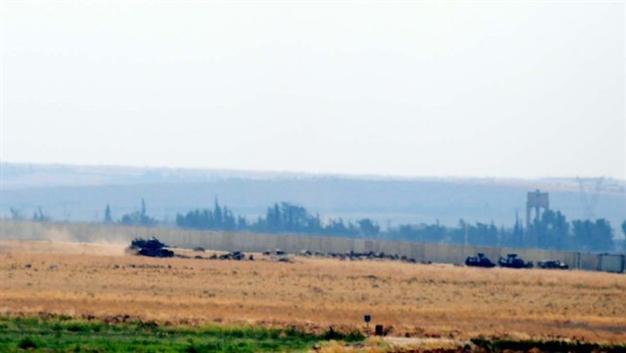Turkey opens second front in Syria’s north
KİLİS

DHA photo
The Turkish military, which has backed Syrian rebels’ advance on Islamic State of Iraq and the Levant (ISIL) in Syria as part of its Euphrates Shield operation, has opened a new front in the neighboring country with tanks and other armored vehicles entering al-Rai.The front across from the Turkish province of Kilis is 25 kilometers west of the initial front opened 12 days ago.
Three rockets fired from ISIL-controlled area hit Kilis earlier in the day, Doğan News Agency reported Sept. 3.
At least 20 tanks, five armored personnel carriers, trucks and other armored vehicles crossed the border, as Turkish Fırtına howitzers fired on ISIL targets, Doğan said.
The Turkish General Staff said the air force also joined the operation by hitting two ISIL targets in al-Rai on Sept. 3, adding that the army did not fire on any non-ISIL targets.
Syrian rebels took over Jarablus on the first day of Turkey’s Euphrates Shield operation launched on Aug. 24 before they started advancing on other towns and villages in the region.
Turkey also insists that People’s Protection Units (YPG), the armed wing of the Syrian Kurdish Democratic Union Party (PYD), should go to the east of the Euphrates River, a red line for Ankara.
Ankara says the PYD is linked to the outlawed Kurdistan Workers’ Party (PKK), which has escalated its attacks in Turkey.
However, the United States, a NATO ally which has backed the Syrian Kurdish militants in the anti-ISIL fight, has advised both sides not to fire at each other.
Pentagon spokesman Captain Jeff Davis said Sept. 1 that ISIL in Syria was about to lose access to Turkey’s porous border, which is a vital step in blocking foreign fighters from replenishing the jihadists’ thinning ranks.
According to Davis, ISIL now retains control of only about 25 kilometers of border with Turkey along an area to the east of al-Rai.
The new Turkish advance comes along this 25-kilometer-wide piece of land.
Turkey in Syria to guarantee country’s territorial integrity
Meanwhile, Prime Minister Binali Yıldırım reiterated that Turkey’s operation into Syria will endure until no terror organization will be able to pose a threat against it, underlining that its primary objective was to secure its 911-kilometer-long border with its southern neighbor. He also reacted against some countries that questioned the presence of the Turkish military in Syria.
“Turkey has got something to do there because Turkey has a 911-kilometer-long border with Syria. But the real question is: what do those who come to Syria from thousands of kilometers away have to do here? Those who ask this question to us should better look at themselves,” he said.
Turkey is in Syria through the Shield of Euphrates Operation that aims “to protect its borders and nationals” as well as to keep Syria’s territorial integrity intact, the prime minister said.
“We’ll return [home] when DAESH [the Arabic acronym for ISIL], the PKK’s offshoots of the YPG and PYD are no longer able to pose a threat to us. Otherwise, one of the most important things to do is to secure our country and citizens,” he said.
Echoing President Recep Tayyip Erdoğan, Yıldırım underlined once again that Turkey would never allow the establishment of an “artificial state” in northern Syria that would only serve global terrorism.
US says no deal on Syria
Meanwhile, the U.S. said Sept. 4 it had not yet struck a hoped-for deal with Russia on stemming the violence in Syria’s brutal civil war, blaming Moscow for backtracking on issues it thought were settled.
U.S. President Barack Obama said earlier that the two sides were “working around the clock” on the sidelines of a summit in China, but that it was “a very complicated piece of business.”
The U.S. State Department said a deal was close and could be announced by Secretary of State John Kerry and his Russian counterpart, Sergei Lavrov, but hours later admitted defeat for now.
“Russians walked back on some of the areas we thought we were agreed on, so we are going back to capitals to consult,” a senior State Department official said.
Kerry and Lavrov will meet again on Sept. 5 in Hangzhou, where G-20 leaders are gathered, he added.
“We’re going to review some ideas tonight, a couple things on these couple of tough issues, and come back together and see where we are,” Kerry told reporters.
“We’re not going to rush,” he said, stressing the importance of reaching a deal that was able “to try to get the job done.”
There remained “a couple of tough issues” to deal with, he said, declining to give details.
On the same day, Syrian government forces and their allies recaptured areas in southwestern Aleppo which rebels seized last month, after heavy bombardments and repeated attempts to drive the insurgents back, the Syrian Observatory for Human Rights reported.
The areas recaptured included the Weaponry College and the Air Force Technical College in the Ramousah area on the city’s southwestern outskirts, the British-based Observatory said.
Rebels captured those areas last month in an assault that broke through a government siege on Aleppo’s opposition-held eastern sector. Recapturing all the territory gained by insurgents in that assault would effectively re-impose the siege.
A rebel official said earlier on Sept. 4 that government forces had entered the Weaponry College but battles were ongoing there.
















